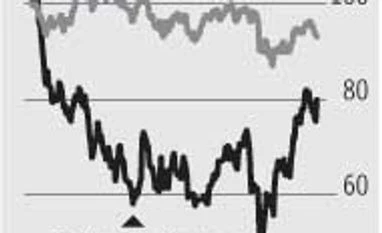A key benefit to Rcom is that the merger will reduce the risks related to spectrum renewal. In the eight markets (including Delhi, Tamil Nadu, Gujarat) where their spectrum holdings overlap, Sistema's holdings (bought in March 2013 auctions) are valid for another 18 years, while Rcom faces renewal over the next six years. The licence period will extend from 2021 and 2033.
The merger will also help Rcom save costs from scale efficiencies be it on utilising spare capacity better, streamlining manpower, lower capex or reducing overlapping costs.
While the deal will need regulatory clearances and a couple of quarters to complete, the Street gave it a thumbs up; Rcom stock closed over six per cent higher. But, there is a flip side as well. In FY15, Rcom's customer base declined with a net loss of 1.4 million customers even as it trails the leaders in key metrics. The biggest overhang for the Street continues to be its balancesheet with a net debt to Ebidta (earnings before interest, tax, depreciation and amortisation) of nearly five times. Rcom's net debt stood at Rs 38,595 as of June 30, 2015. While RCom is working on selling its towers, global operations and other assets, so far not much has fructified.
This financial pressure means that it is not able to match its peers as far as capex on 4G is concerned. While RCom has a capex of about Rs 2,000 crore for FY16, its peers Idea Cellular and Bharti Airtel have a capex of about three to six times that number partly due to their bigger size.
The telecom market continues to be fiercely competitive and the road ahead will be tough for RCom unless it is able to meaningfully cut debt and improve its operating metrics. Most analysts continue to have a sell rating on the stock.
)